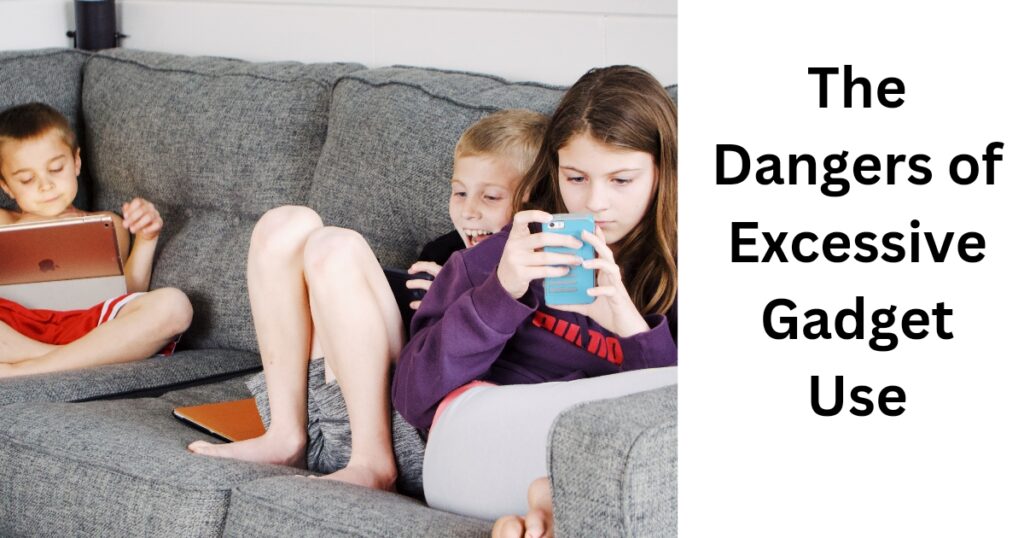As a parent, if you want a gadget free child, then you will get an answer from this article.
You want only the best for your child’s growth and development. In today’s digital age, gadgets have become a part of our daily lives, and it’s easy to rely on them to keep our children occupied. However, excessive gadget use can have negative effects on a child’s development.
Encouraging a gadget-free lifestyle can nurture creativity, social skills, and bonding within the family. Engaging play and activities offer a fun and stimulating way to help your child develop into a happy and healthy individual.
Key Takeaways:
- Excessive gadget use can have negative effects on a child’s development.
- Gadget-free play can help nurture creativity, social skills, and bonding within the family.
- Engaging play and activities offer a fun and stimulating way to help your child develop into a happy and healthy individual.
The Dangers of Excessive Gadget Use

As much as electronic gadgets are essential in our daily lives, they pose a significant threat to child development and overall well-being.
The excessive use of gadgets has been linked to several negative effects, including impaired social skills. Children who spend too much time using gadgets may struggle with communication and fail to develop important social skills like empathy and teamwork, as they lack exposure to real-life interactions.
Gadget dependency also affects physical health, which is a significant concern for parents. Children who spend most of their time on electronic devices are at risk of developing poor posture, obesity, poor eyesight, and other related health problems.
It’s essential to limit gadget use to prevent such problems from developing.
The Dangers of Excessive Gadget Use
“A lot of parents compound the problem by letting their children use gadgets for an excessive amount of time. You see them sitting in restaurants with their gadgets, so they’re not talking to each other anymore. It’s a serious problem.” – Steve Jobs
Steve Jobs, the founder of Apple, echoed this problem back in 2010, and since then, there hasn’t been much change in the situation.
Children’s brains are highly susceptible to gadget addiction, leading to anxiety, depression, and behavioral problems. Therefore, regulating gadget use should be a top priority for parents.
With that said, you can limit gadget use by balancing screen time with other activities like reading, outdoor play, and creative play.
For Gadget Free Child Promote Creativity Through Play

Unleashing your child’s creativity can be done through play. Play is not only fun but also an essential learning activity that contributes to your child’s development. It promotes problem-solving, decision-making, and imagination, among other skills. Here are some gadget-free suggestions for promoting creativity through play:
- Imaginative Play: Provide your child with dress-up clothes, dolls, stuffed animals, and other props to encourage pretend play. Role-playing helps your child to develop social-emotional skills, creativity, and communication.
- Artistic Activities: Encourage your child to draw, paint, sculpt, or build with materials such as clay or blocks. This kind of activity develops fine motor skills, hand-eye coordination, and self-expression. The final artistic expression is a reward in itself, promoting a sense of accomplishment and self-confidence.
- Creative Writing: Encourage your child’s love for writing by providing them with journals, notebooks, or blank drawing books. Let them create their own stories, poems, or comic strips.
- Cooking and Baking: Spend time with your child in the kitchen, letting them help you with measuring, stirring, or decorating. Cooking is a creative activity that promotes independence, problem-solving, and following instructions. Plus, it creates delicious treats for the whole family!
Remember, by encouraging creativity, you’re enabling your child to explore the world in their own unique way, and allowing them to feel empowered in their own sense of imagination. Allowing your child to explore their creativity is all part of their development, and fostering their interests in this way will help build self-esteem and an independent sense of being.
Building Social Skills Through Play
In today’s digital age, it can be tempting to rely on gadgets to keep your child occupied. However, it’s important to remember that gadget-free playtime is essential for your child’s development, particularly in building social skills such as communication and teamwork.
Engaging in play activities with others helps your child learn how to communicate effectively, share their thoughts and ideas, and work together towards a common goal. This is especially important for young children who are still learning how to interact with others.
Encourage your child to participate in activities such as board games, sports, or imaginative play with friends. These activities provide opportunities for communication, problem-solving, and teamwork, all crucial skills for your child’s development.
Remember, while technology may offer convenience and entertainment, nothing beats the benefits of unplugged play when it comes to building important social skills.
Bonding with Family and Friends

Spending quality time with loved ones is essential for building strong relationships and creating lasting memories. Instead of relying on gadgets to entertain your family and friends, try out some of these fun and meaningful activities:
- Plan a family game night with board games, card games, or charades.
- Have a family picnic at a local park or beach. Bring a Frisbee or ball to play with.
- Take a hike or nature walk with your family or friends. Enjoy the fresh air and scenery.
- Host a potluck dinner where everyone brings their favorite dish to share. Spend time cooking and baking together.
- Organize a group outing to a museum, zoo, or aquarium. Learn and explore together.
These activities are not only fun, but they also provide opportunities for bonding, communication, and teamwork. Remember, the most valuable thing you can give your loved ones is your time and attention.
Outdoor Adventures and Nature Exploration
Spending time in nature is not only fun, but it also offers numerous benefits for children. Outdoor activities promote physical activity and help build essential skills such as problem-solving and decision-making.
One great way to experience nature is by going on a hike. Find a local park or trail and bring along some snacks, water, and a map. Challenge your child to spot different types of plants or animals along the way. You can also encourage them to take pictures or draw what they see.
If you live near a beach or lake, consider renting a canoe or kayak. Paddling is a great workout and can be a fun way to explore the water. Another option is to go fishing. Teach your child how to bait a hook and cast a line. They will love the excitement of reeling in their own catch!
Outdoor scavenger hunts are another exciting way to explore nature. Make a list of things your child can find outside such as pinecones, leaves, or rocks. You can also challenge them to find specific colors or shapes. This activity can be done in your backyard or at a nearby park.
Remember to dress appropriately and pack sunscreen and bug spray. Spending time in nature is a great way to unplug and connect with your child.
Fostering Creativity Through Play
Play is not just a fun way to pass the time – it’s also an essential way for children to learn and develop creativity. By engaging in imaginative play and artistic activities, children can explore their interests and discover new ways of thinking.
Encourage your child to engage in imaginative play by providing props and costumes for dress-up, or simply encouraging them to use their imagination to create their own stories and scenarios. Artistic activities such as painting, drawing, and crafting are also great ways to foster creativity and self-expression.
Remember, gadget-free play allows for unlimited opportunities for creativity and self-expression. By providing your child with the tools and materials for imaginative play and artistic expression, you are encouraging them to expand their minds and develop important life skills.
Unplugged Games and Puzzles
When it comes to enhancing cognitive skills, unplugged games and puzzles are a great option. These activities help develop critical thinking, problem-solving, and decision-making skills, all while providing hours of fun.
You can choose from a variety of age-appropriate games and puzzles that can be played without gadgets. For younger children, simple games such as “Memory,” “Guess Who,” and “Connect Four” provide a great starting point. As children get older, more complex games such as chess or strategical board games like “Risk” or “Clue” can be introduced.
Puzzles also come in various forms, including jigsaw puzzles, crosswords, and Sudoku. These challenges can help improve cognitive function, memory, and spatial awareness, making them a great option for children to do on their own or with friends and family.
Playing unplugged games and puzzles can also be a great way to spend quality time together. You can organize a family game night or puzzle challenge, which can be a fun and engaging way to bond and build memories together.
Fostering Creativity Through Play
Encouraging imaginative play and artistic activities is essential in fostering creativity among children. According to research, play stimulates children’s creativity by allowing them to explore and express themselves freely. Here are some ideas for gadget-free activities that can spark creativity:
- Drawing and painting: Provide children with art supplies such as paper, crayons, and paints to encourage their artistic expression.
- Dress-up and make-believe: Allow children to pretend to be someone or something else, whether it’s a superhero, a princess or a pirate.
- Building with blocks and Legos: Building with blocks and Legos can help children develop problem-solving skills and spatial awareness.
These activities not only promote creativity but also allow children to have fun while learning important life skills.
Incorporating Music and Dance
Music and dance are powerful tools for promoting self-expression and emotional well-being among children. Encouraging your child to dance and sing along to music can help them develop their coordination, rhythm, and motor skills, while also boosting their confidence and creativity.
You can start by playing some of your child’s favorite songs and encouraging them to dance along. You can also try teaching them simple dance routines or signing them up for a beginner’s dance class. This is a fun way to bond with your child and help them develop a love for music and movement.
If your child is more musically inclined, you can also encourage them to explore different instruments, such as the piano or guitar. This can help them develop their musical abilities and give them an outlet to express themselves creatively.
Overall, incorporating music and dance into your child’s daily routine can help them develop various skills and boost their emotional well-being. So why not turn up the music and dance together?
Setting Boundaries and Limiting Gadget Use:
As a parent, it can be challenging to limit your child’s gadget use, especially when it seems like everyone else is using them. However, setting boundaries is necessary to establish healthy habits and ensure that your child engages in a variety of activities.
Start by creating a schedule that includes specific times for gadget use and other activities. Encourage your child to participate in gadget-free play, outdoor adventures, reading, and other engaging activities that promote creativity and social development. You can also set a time limit for gadget use and stick to it, gradually reducing the time as your child becomes more accustomed to other activities.
It’s also essential to model healthy gadget use by limiting your own screen time and engaging in activities with your child. Encourage open communication and listen to your child’s concerns about gadget use. By setting boundaries and limiting gadget use, you can help your child develop healthy habits and enjoy a gadget-free childhood.
Fostering a Gadget-Free Child: Encouraging Engaging Play & Activities
As a parent, you want the best for your child’s development. That means providing an environment for healthy growth and fostering skills that will serve them well throughout life. One of the best ways to do that is to encourage your child to be gadget-free and engage in play and activities that promote creativity, imagination, and social skills.
Children who are gadget-free benefit from engaging play and activities that promote healthy development. Without excessive gadget use, they develop important social skills such as communication and teamwork, foster creativity and imagination, and strengthen their bond with family and friends.
By fostering a gadget-free environment, you can promote activities that are fun and meaningful, such as nature exploration, DIY projects, unplugged games and puzzles, reading and storytelling, and incorporating music and dance into their daily routine. These activities promote problem-solving skills, cognitive development, and emotional well-being.
The Importance of Engaging Play and Activities
Engaging play and activities provide a spillover effect into other areas of a child’s development. Physical activity, for example, promotes the development of gross and fine motor skills, while cognitive activities such as games and puzzles promote analytical thinking and problem-solving skills.
Social interactions and experiences with family and friends are critical for a child’s social and emotional development. Engaging play and activities promote communication, teamwork, and collaboration, which are essential for navigating the world successfully.
Fostering Creativity Through Play
One of the significant benefits of gadget-free play is its promotion of creativity. Children who engage in imaginative play and artistic activities allow their minds to go wild, flexing their creativity muscles and developing problem-solving skills in a low-pressure environment. Encouraging creativity through play boosts confidence and creates well-rounded individuals.
Building Social Skills Through Play
Among the many skills children develop through gadget-free play, social skills are perhaps the most valuable. Simple play activities like board games, outdoor adventures, and role-playing help children develop social skills such as communication, empathy, and teamwork. Without excessive gadget use, children develop a stronger bond with family and friends, leading to a stable and emotionally healthy future.
Bonding with Family and Friends
Spending quality time with family and friends is essential for child development. Meaningful activities such as family game night, making a meal together, or planning a picnic promote communication, problem-solving skills, and create unforgettable memories.
Outdoor Adventures and Nature Exploration
Nature exploration provides physical and mental benefits for children. Engaging in outdoor activities such as hiking, camping, and gardening promotes physical activity and provides a low-stress environment to process ideas and reflect on life’s mysteries. It also encourages problem-solving skills and promotes a sense of adventure.
Simple and Fun DIY Projects
Do-it-yourself (DIY) projects encourage creativity, planning, and problem-solving skills. These projects can be easy and fun and can include activities such as painting, building forts, or cooking. DIY projects and crafts nurture children’s creativity and imagination and provide a great opportunity for bonding with family and friends.
Unplugged Games and Puzzles
Unplugged games and puzzles that promote cognitive development are perfect for gadget-free playtime. Games such as chess, scrabble, and monopoly, promote critical thinking skills and problem-solving skills. Puzzles like jigsaw puzzles, crosswords, and sudoku promote cognitive development and concentration.
Reading and Storytelling
Reading and storytelling promote language development, imagination, and critical thinking skills. Creating a reading-friendly environment at home encourages children to read and instills in them a lifelong love for learning.
Incorporating Music and Dance
Incorporating music and dance into a child’s daily routine promotes self-expression, emotional well-being, and creativity. Encourage your child to listen to and experiment with different genres of music, and to dance, move, and express themselves without inhibition.
Setting Boundaries and Limiting Gadget Use
Setting boundaries and limiting gadget use is critical in today’s gadget-dependent world. Encourage your child to engage in a variety of activities and set limits on screen time. Establishing healthy habits from a young age promotes a well-balanced and grounded lifestyle.
Conclusion
As a parent, fostering a gadget-free lifestyle can seem daunting. However, by promoting engaging play and activities, parents can play an important role in their children’s social, cognitive, and emotional development. Children who engage in gadget-free play and activities are happier, more emotionally stable and confident, and are better prepared for the world around them. So, go ahead, disconnect, and encourage your child to engage in meaningful and fun activities that will set them up for a lifetime of success!
People Also Read: Parenting Skills: Nurturing Responsible and Mature Children through the Power of Positive Techniques.
FAQ:
Q: What is a gadget-free child?
A: A gadget-free child is a child who engages in play and activities without the use of electronic gadgets such as smartphones, tablets, or video games.
Q: Why is it important to encourage engaging play and activities?
A: Engaging play and activities are important for a child’s development as they promote creativity, social skills, and bonding with family and friends.
Q: What are the dangers of excessive gadget use?
A: Excessive gadget use can have negative effects on a child’s development, including impaired social skills and physical health issues.
Q: How can play foster creativity?
A: Play allows children to use their imagination and explore their creativity. Activities such as imaginative play and artistic projects can foster creativity without the need for gadgets.
Q: How does gadget-free play help build social skills?
A: Gadget-free play encourages social interaction, communication, and teamwork, which are essential for developing important social skills.
Q: How can gadget-free activities strengthen family bonds?
A: Engaging in gadget-free activities promotes quality time and strengthens relationships between family members and friends.
Q: Why are outdoor adventures important for children?
A: Outdoor activities and nature exploration provide numerous benefits, including physical activity, fresh air, and an opportunity to connect with nature.
Q: What are some simple and fun DIY projects for children?
A: DIY projects can promote creativity and problem-solving skills. Ideas include crafting, building, or experimenting with materials found at home.
Q: How do unplugged games and puzzles enhance cognitive skills?
A: Unplugged games and puzzles challenge children’s thinking, problem-solving, and cognitive abilities without the use of gadgets.
Q: Why is reading and storytelling important for children?
A: Reading and storytelling nurture children’s imagination and language development, while also fostering a love for books and learning.
Q: How can music and dance be incorporated into a child’s daily routine?
A: Music and dance offer opportunities for self-expression and emotional well-being. Parents can encourage their children to participate in music classes or have regular dance sessions at home.
Q: How can we set boundaries and limit gadget use?
A: Setting boundaries and establishing healthy gadget habits can be done by creating designated screen-free times and introducing alternative activities.
Q: What is the importance of encouraging a gadget-free child lifestyle?
A: Encouraging a gadget-free child lifestyle promotes creativity, social skills, bonding, and overall healthy habits for children’s development.



